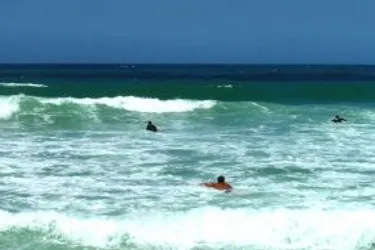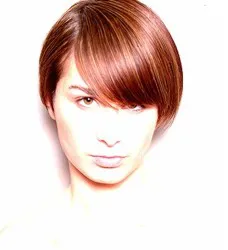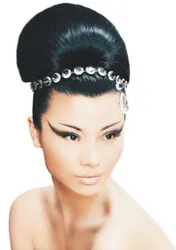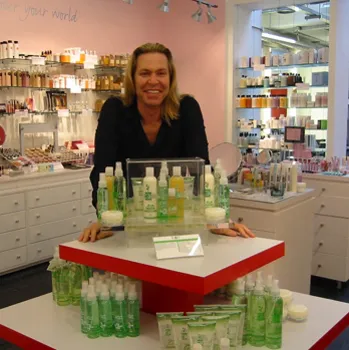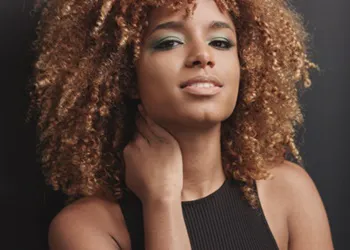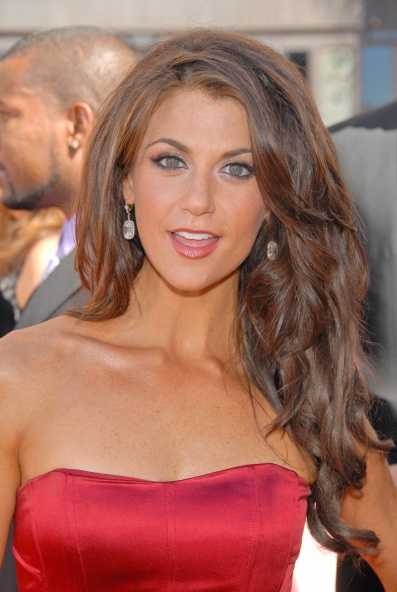
Hairstyles: Wet Bunning
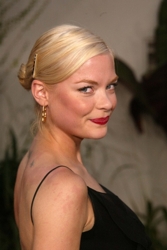 Yeah, I know, it sounds....um...a little suggestive, but trust me, this is a favorite hair technique for anyone with hair that is medium to long.
Yeah, I know, it sounds....um...a little suggestive, but trust me, this is a favorite hair technique for anyone with hair that is medium to long.
Super long haired folks are huge fans of the wet hair bun, also referred to as wet buns or wet bunning.
(Images of Jaime King - DailyCeleb.com - all rights reserved).
Have I done wet bunning on my own hair? Yes, I have been doing the wet bun deed since 1988 when I first got serious about having super long healthy hair.
Wet bunning means simply to towel blot excess moisture, detangle and then apply the desired styling/conditioning products before wrapping damp strands into a big fat bun at the back of the head. This is a way to air dry and encourage texture along with other benefits.
When I oil my hair with my favorite oil - HairTopia Beautiful Hair Oil I use the wet bun technique. My favorite leave-in conditioners for wet bunning my own hair? Phyto 7, Phyto 9 and Rene Furterer.
Why would anyone do wet bunning to their own hair? There are lots of advantages to the technique if it is done correctly and with your hair's best interest at heart.
Advantages of creating wet buns:
1. Provides an easy method for allowing hair to air-dry.
2. Eliminates the need for hot tools - hot blow dryers, hot irons or rollers.3. Encourages retention of moisture in hair as tresses dry naturally.
4. Amps up natural textures such as curls, waves when bunned to encourage texture creation.5. Provides option to deep condition with oils while wearing hair in bun during the day.
6. Natural hair may actually lie flatter after wet bunned for a period of time.7. Provides natural option for those transitioning from chemically treated hair to all natural hair.
8. Minimizes wear and tear on hair.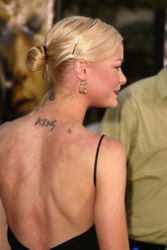 Wet buns can be wrapped loose, tight or in-between depending on your ultimate hair goal. To prevent hair breakage around the the ears or hairline avoid pulling wet or damp hair too tightly on a daily or regular basis since there is a remote possibility of traction alopecia.
Wet buns can be wrapped loose, tight or in-between depending on your ultimate hair goal. To prevent hair breakage around the the ears or hairline avoid pulling wet or damp hair too tightly on a daily or regular basis since there is a remote possibility of traction alopecia.
(Images of Jaime King - DailyCeleb.com - all rights reserved).
If you do pull hair tightly, be sure not to do it every day or make sure you take the bun down to prevent long term pulling or stretching to the hair.
Wet Bunning Facts:
1. Depending on the type (thin/fine, medium or thick) and texture (straight, wavy, curly, kinky) of your hair your hair may dry fast, slow or even take days to completely dry.
2. Always towel blot hair before applying leave-in conditioners and/or oils to minimize water drippage.3. Only use "hair friendly" pins or clips to make sure hair is not damaged. Remember, hair is most fragile when it is wet or damp.
4. Do not brush strands before wrapping in a bun. Hair is more prone to breakage when it is damp and brushed. Detangle with a wide tooth comb with smooth teeth or use your fingers. Make sure fingers are free of calluses or other rough spots. For extra protection coat fingers with leave-in conditioner to protect and smoothe hair.5. Wet bunning can be combined with
Directions For Web Bunning:
Everyone will find their own "best" wet bunning tips over time. However, as a starting point, listed below are some general wet bunning directions:
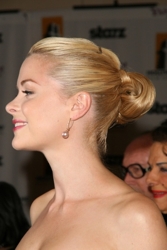 1. Wash hair in lukewarm water.
1. Wash hair in lukewarm water.
2. Apply rinse-out conditioner
3. Rinse well4. Finish with cool/cold water
5. Towel blot6. Detangle
7. Apply desired leave-in conditioner, oil or other desired product.8. Pull into loose mid-scalp ponytail. Do not fasten pony. Take tail and wrap clockwise into fat bun.
Pin or clip into place. If desired, apply a plastic bag (or Saran Wrap) to cover the bun and encourage heat to speed up conditioning process.
Note: Experiment with using 1 1/2 - 2 inch hair pins with rubber tips to prevent scratching scalp or hair. If you use scrunchies or twisties make sure they are hair friendly and will not snag strands. Octupus clips make great wet bun clips.
You can partially air dry and/or blow dry either before or after wet bunning. If you decide to blow dry, be sure to do so on the lowest coolest setting. After drying you can style hair by braiding, cornrowing or other hairdos.
Visit the HairBoutique.com Gallery of Hairstyles for over 24,000 examples. For more information about wet bunning refer to: Review Of Rene Furterer's Fioravanti Gel defrisant.
I would love to hear your tips and long term results with wet bunning. Please email me at [email protected] or visit our HairTalk Forum and post your own techniques. Follow us on Twitter.Social Media Network Information
Please follow us on Twitter at: https://Twitter.com/HairBoutique. I look forward to meeting new people from all walks of Twitter and learning from their Tweets.


